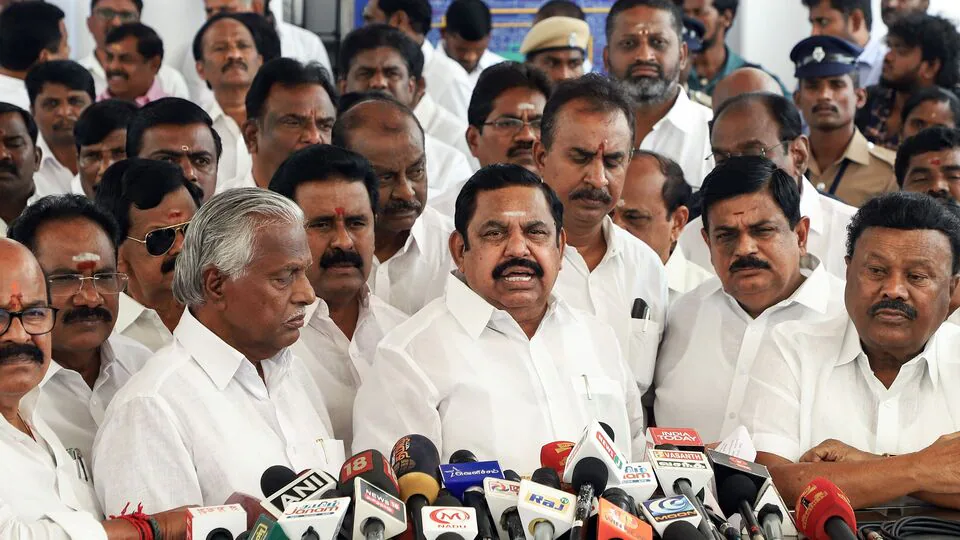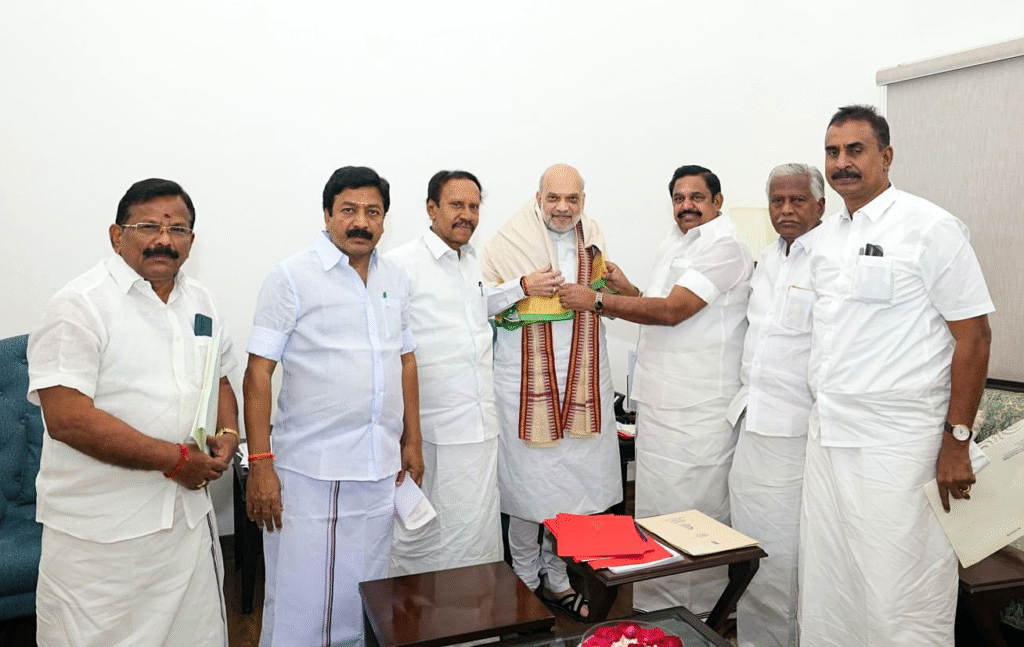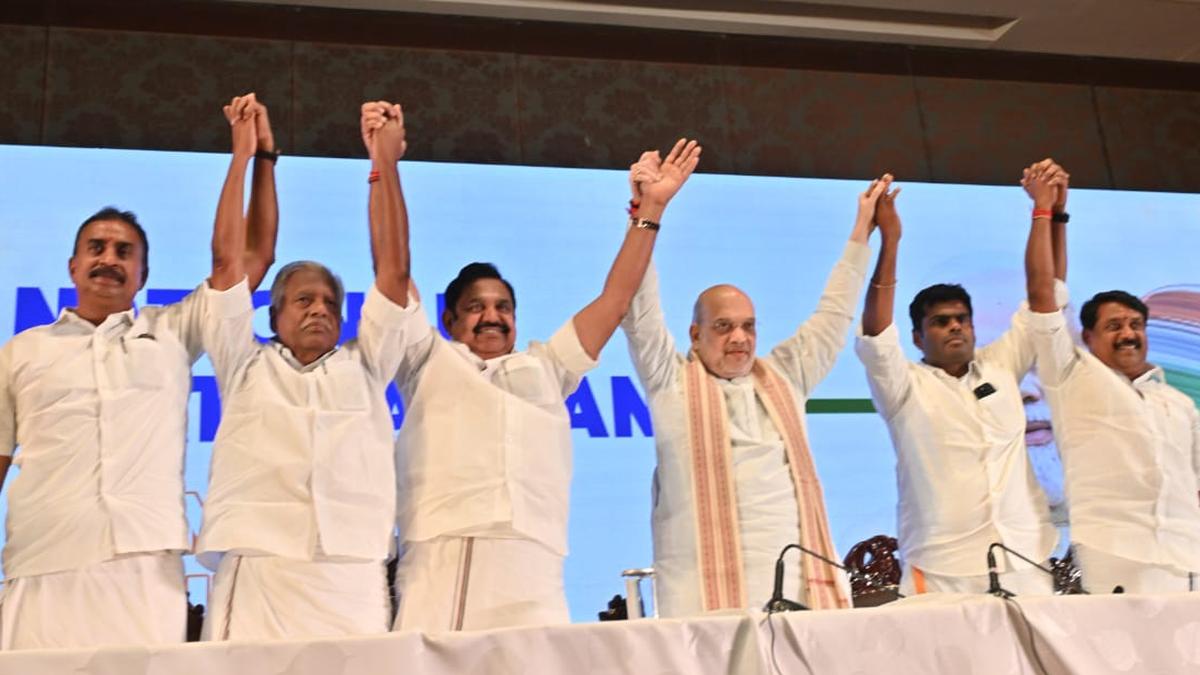
The political atmosphere in Tamil Nadu is once again thick with anticipation as the state approaches its crucial 2026 assembly elections. The electoral battle is shaping up to be an intense contest involving major players such as the AIADMK and DMK, with an intriguing new variable — the possible political entry of Tamil superstar Vijay. Meanwhile, the BJP’s strategy of cautious ambiguity adds another layer of complexity to the electoral chessboard.
This blog explores the evolving scenario with a focus on the significance of film personalities in Tamil Nadu politics, the strategic posture of the ruling DMK, the BJP’s calculated moves, and the broader implications for the 2026 elections. With decades of history where cinema and politics intertwine, Tamil Nadu’s political narrative continues to captivate millions.
The Cinematic Roots of Tamil Nadu Politics and Vijay’s Potential Leap
Tamil Nadu is unique in Indian politics for its deep and historic connection between cinema and political leadership. Since the 1960s, iconic film personalities have made seamless transitions to political prominence, wielding their screen popularity as a launchpad for mass appeal. Leaders like M.G. Ramachandran (MGR), J. Jayalalithaa, and Karunanidhi’s close association with cinema have shaped decades of Tamil Nadu’s political culture.
Within this context, Vijay, one of Tamil cinema’s biggest contemporary stars, is widely speculated to be considering a formal political role. His massive fan base, especially among the youth, makes him an attractive prospect for political alliances. Vijay’s films often highlight social justice, family values, and ethical integrity, resonating well beyond the screen and connecting emotionally with audiences.
Reports of a potential Vijay-AIADMK alliance have triggered political chatter and strategic recalibration among parties. AIADMK, once the undisputed powerhouse under Jayalalithaa’s leadership, is eager to regain its lost dominance and sees Vijay’s star power as a critical asset to energize its base.
What Makes Vijay a Game-Changer for AIADMK?
Vijay’s appeal is not just limited to his celebrity status. His films and public persona project an image of integrity, justice, and empathy—qualities that many voters admire and associate with leadership. This makes the speculation of his political entry a serious matter for both AIADMK and rival parties.
For AIADMK, which suffered setbacks after Jayalalithaa’s demise, aligning with Vijay could represent a revival strategy. The party has struggled to regain its past momentum, and the infusion of fresh energy through a popular figure could help it reconnect with disillusioned voters, particularly the youth and urban segments.
Additionally, Vijay’s non-controversial public image and widespread acceptance across caste and community lines provide AIADMK with an opportunity to broaden its electoral base. This strategic gamble could be vital in countering the DMK’s strong grassroots organization and governance record.
However, the road to a formal alliance is complex. Vijay has maintained a carefully neutral stance, avoiding direct political statements, which suggests a cautious approach to entering a turbulent political arena. For AIADMK, negotiating terms that honor Vijay’s brand and ensure a constructive role in the party is crucial.
DMK’s Confidence and Calculated Downplay of Star Power
While speculation swirls around Vijay’s political aspirations, the ruling DMK appears unfazed, taking a pragmatic and confident stance. M.K. Stalin’s leadership has been characterized by a focus on welfare schemes, infrastructure development, and social inclusivity, which has helped consolidate the party’s position.
DMK leaders have publicly downplayed the electoral impact of actors and celebrities, emphasizing governance achievements and policy outcomes. This approach is indicative of a broader shift in Tamil Nadu politics, where voters are increasingly evaluating parties based on performance and development agendas rather than emotional appeals tied to cinema.
The DMK’s strategy involves strengthening its cadre network and reinforcing alliances with smaller regional parties. This robust grassroots machinery helps the party maintain voter engagement and loyalty, making it less vulnerable to sudden shifts caused by celebrity interventions.
Moreover, DMK’s messaging is carefully crafted to highlight tangible benefits delivered to the public, such as improved health care, education reforms, rural development, and social welfare schemes. This narrative aims to frame the 2026 election as a choice between proven governance and speculative star charisma.
BJP’s Tactical Flexibility: A Silent Player in Tamil Nadu’s Complex Politics
The Bharatiya Janata Party (BJP), despite its national prominence, has traditionally found it challenging to make significant inroads in Tamil Nadu. The state’s unique political culture and linguistic pride have limited the BJP’s appeal so far. Nonetheless, the party’s strategy for 2026 shows a nuanced understanding of these dynamics.
Instead of prematurely committing to fixed alliances, the BJP is maintaining a flexible stance, signaling openness to collaborate with multiple regional players depending on evolving ground realities. This ambiguity allows the BJP to retain bargaining power and adjust tactics as the election approaches.
BJP’s incremental efforts focus on expanding grassroots support through cultural engagement, urban outreach, and leveraging national development narratives. The party’s aim is to emerge as a viable alternative, especially in urban and semi-urban constituencies where it has seen pockets of growth.
The BJP also recognizes the importance of Tamil identity and regional sensitivities, which is why it has not aggressively pushed a full-fledged political front in the state. Instead, it balances national ambitions with local pragmatism.
The Historical Influence of Cinema in Shaping Tamil Nadu’s Political Identity
Tamil Nadu’s unique political identity has been shaped by its cultural affinity to cinema. The Dravidian movement itself used cinema as a medium for spreading social and political messages. Film stars became symbols of Dravidian ideology, anti-caste movements, and social reform.
MGR’s charismatic leadership combined with his cinematic fame transformed Tamil Nadu politics for decades, making him a beloved figure who transcended party lines. Jayalalithaa’s similar trajectory further cemented the pattern where actors commanded extraordinary political clout.

This historical backdrop means that the entry of any major film star into politics is never merely symbolic. It triggers widespread expectations and realignments within the political ecosystem. However, recent trends suggest the electorate is becoming more nuanced, scrutinizing candidates for their policy substance as well as star appeal.
Vijay’s potential political move must be understood against this complex historical and cultural tapestry, which continues to evolve with changing voter demographics and media influence.
The Role of Youth and Urban Voters in the 2026 Elections
One of the most significant factors influencing Tamil Nadu’s political future is the growing importance of youth and urban voters. The younger generation, more connected through social media and digital platforms, demands transparency, accountability, and development-driven politics.
Vijay’s popularity among youth is undeniable, but the 2026 elections will test whether star power alone can translate into votes amid rising political awareness. The AIADMK hopes to harness this enthusiasm through Vijay’s image, while DMK counters with its welfare schemes targeted at education, skill development, and employment.
Urban voters, exposed to diverse narratives and issues, are expected to play a decisive role. Issues such as infrastructure, public transport, pollution control, and economic opportunities will weigh heavily in their choices. Both DMK and AIADMK are crafting policy promises aimed at addressing these concerns.
The Political Impact of Social Media and Digital Campaigns
In recent years, Tamil Nadu politics has witnessed a digital transformation. Political parties are increasingly leveraging social media platforms to communicate directly with voters, bypassing traditional media gatekeepers.
Vijay’s strong presence on social media amplifies the speculation around his political prospects. Fan clubs and digital communities actively promote his persona, creating a parallel influence network that parties are keen to tap into.
DMK and BJP have also ramped up their digital campaigns, using targeted messaging, data analytics, and influencer partnerships to reach diverse voter segments. This digital battleground will be crucial in shaping perceptions and mobilizing support in the lead-up to the polls.
The ability to adapt to this new political communication landscape will be a key determinant of success in 2026.
Electoral Alliances: The Fragile Balancing Act
Tamil Nadu’s electoral politics is famously shaped by alliances that can shift with surprising speed. The AIADMK and DMK have historically formed coalitions with smaller parties representing various caste, regional, and ideological groups.
The potential Vijay-AIADMK alliance introduces a fresh dynamic, but it also complicates existing equations. Other smaller allies may reassess their positions, and vote-splitting scenarios could emerge if negotiations falter.
DMK’s existing alliances are being strengthened carefully, while BJP’s open-ended approach keeps many options on the table, including partnerships with AIADMK or regional entities.
This fluidity makes the 2026 elections unpredictable, with last-minute changes possible based on evolving political interests and voter sentiment.
Governance, Development, and Public Sentiment: The Core Battleground
At the heart of the 2026 elections lies a critical question: will voters prioritize governance and development over personality-driven politics?
DMK’s focus on public welfare programs, health infrastructure, and social justice is positioned as evidence of its capability to deliver results. AIADMK counters by promising renewed focus on stability, economic revival, and inclusion, now with the added allure of Vijay’s charisma.
The BJP, meanwhile, emphasizes national development narratives and economic reforms, hoping to carve out a distinct space.
Voter sentiment is expected to be influenced by multiple factors including inflation, unemployment, rural distress, and education access. How parties address these issues in their campaigns and governance records will ultimately sway the electorate.
Conclusion: A High-Stakes Political Drama Unfolds
The run-up to Tamil Nadu’s 2026 assembly elections promises a fascinating and high-stakes political drama. The possible Vijay-AIADMK alliance, DMK’s confident governance narrative, and BJP’s cautious yet ambitious positioning create a multi-layered contest.
For voters, the choice will likely hinge on a blend of emotional appeal, policy substance, and local leadership. The intersection of cinema, politics, and social issues makes Tamil Nadu a unique political arena, where history and modernity collide.
As parties finalize their strategies and alliances solidify, the state’s political future hangs in balance, with every move scrutinized by millions. Tamil Nadu’s electorate remains poised to write yet another memorable chapter in its vibrant democratic story.

